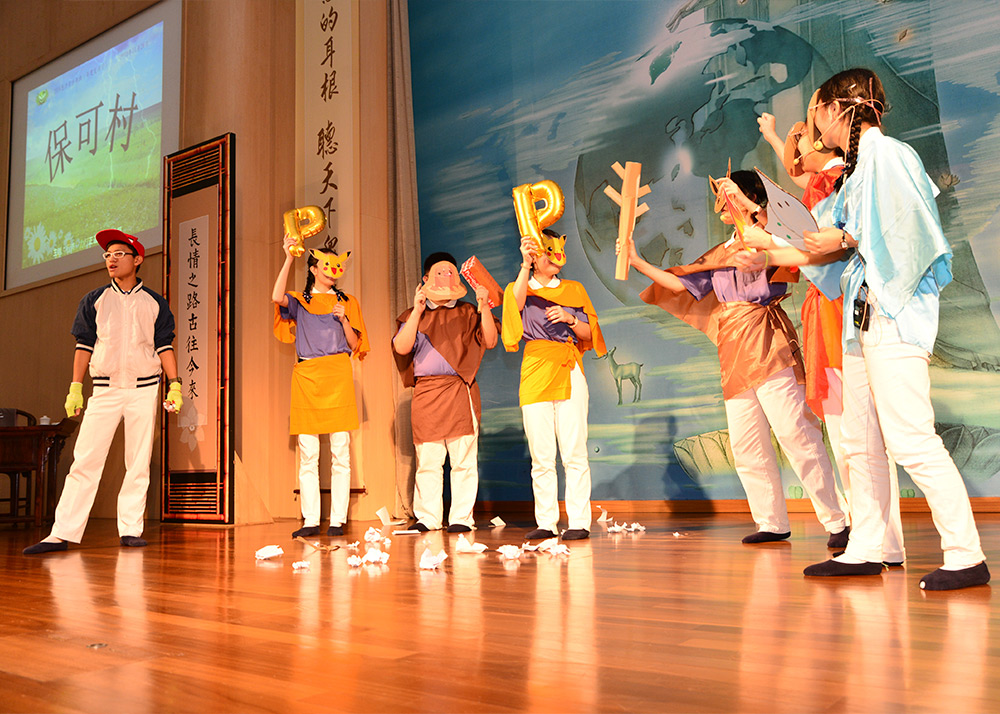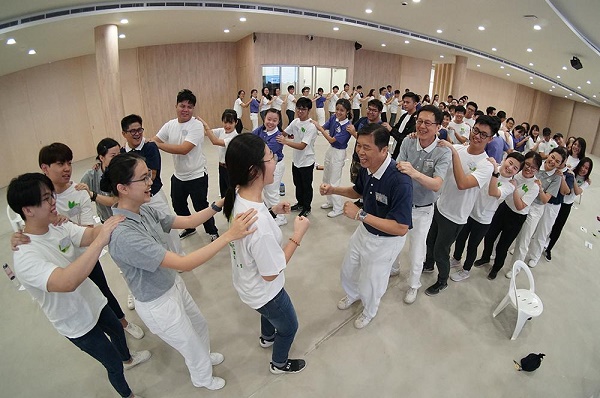
Madam Huang Ya Ping talks about the pros and cons of technological advancements as it relates to a child’s developmental process, and shares communication techniques with her audience. She stresses the importance of parents being the best ethical role model for their children. (Photo by Tan Paik Hui)
Once, a curious parent asked Mr Li Wen Yi, a Head of Department (HOD) of a school: “Mr Li, how do you manage to hold a conversation so easily with my child?” Li explained that the secret to communication is none other than the art of listening.
However, parents and their children hardly have time to listen to each other; could it be that busy city life has robbed them of such opportunities, or is it perhaps the fault of ubiquitous technological devices that have brought so much convenience to our lives?
Mr Li and Madam Huang, a teacher by profession, both from the Taiwan Tzu Chi Teachers Association, shared their interpretation of the modern parent-child relationship and recommended a new “communication recipe” for the Singaporean dual-income family during the “Advanced Technology vs the Parent-child Relationship” talk on 30 August 2013. A total of 320 participants, many of them parents with children in tow, attended the evening talk in the Jing Si Hall.
Building Family Bonds in a Technological Era
In an era of information explosion, high tech devices such as smartphones, tablets and electronic games have become a necessary part of our lives. Regardless of age, everyone is focused on their device and oblivious to the people around them.
Madam Huang cited an example: “Once a little girl was throwing a tantrum and her mother said, “Wait a minute, let Peipei accompany her.”Peipei is neither the mother’s nickname nor the name of the girl’s doll, but an iPad!” Later, as the mother bid goodbye to her daughter, she was upset to find that the girl’s attention was focused solely on the tablet, and her eyes teared up. Madam Huang felt that the hearts of young children seem to have been stolen by these “3C products”( term used to describe computers, communications and consumer electronic devices in Taiwan).
Madam Huang feels that the technological era has brought upon us not only the problem of being addicted to smartphones, but also damage to our vision and spinal columns from spending long hours with heads bowed towards the screen. Through the process of investigating the real world around us, for example, mountain climbing and interacting with nature etc., children can develop their observation and analytical skills and this experience cannot be replaced by virtual experiences such as watching travelogues or playing computer games. For the long term development of their children, parents should encourage a more hands-on environment and regulate children’s use of 3C devices.
“Provide for your children ‘sufficiently’ but not ‘excessively.’ We need to encourage gratitude. If gratitude is not fostered in the process of giving, the more you give, the greater the damage.”At the same time, Madam Huang mentioned that parents need to strive to be the best moral role models for their children.
Participating volunteer, Xu Yu Bao, is a pre-school teacher, and she hopes to share what she had learnt that night with her students’ parents: “Children nowadays take for granted what their parents’ provide for them, and lack respect for their elders. Just as Madam Huang said, parents need to manage the parent-child relationship well, and effectively pass the correct moral values down to the next generation, even as they care for them.”
If we create a good environment of love and kindness, and frequently interact with good people, our lives will improve. ‘Before children can have a chance to go astray, let them learn to be good. Tzu Chi is one such organization that you can entrust with this task.”Madam Huang encouraged the congregation to join as Tzu Chi volunteers, to guard their own hearts well against negativity, and with the power kindness, create a harmonious environment and society. With parents leading by example, and under the influence of a good environment, the innocent hearts of children, once planted with the seeds of love, will not easily sprout the weeds of evil.
Lessons of Love from “the Bullfighting Teacher”
Mr Li played a short film, “Farewell! My Bullfighting Teacher!’ at the start of the second half of the seminar. Everyone couldn’t help but wonder, why would the main character of the film be called “the Bullfighting Teacher”?
Previously a school discipline master, Mr Li had set up a school basketball team and used the format of a three on three “Bullfighting” competition to retain students with poorer grades. Students can only leave the basketball team after they have won the match. Through basketball, he hoped to cultivate discipline and team work. The main character of the story is none other than Mr Li himself.
Mr Li was a rebellious student during his high school days. Then he met his teacher, Madam Su Er, who never once gave up on him. He aspired to be a teacher, and eventually volunteered to teach at his alma mater. Surrounded by such places as the night market and food market, the environment of the school was not conducive for students and disciplinary problems were rather common. The school principal even found it hard to believe that any teacher would volunteer to teach in his school.
Mr Li would never give up on any student no matter how problematic, and it was this love that was instrumental in turning their lives around. When she was very young, Xiao Jing, a student at the school, had had her left hand scalded by boiling water by her own mother. At the time of the incident, her mother was high on drugs and in a drug-induced stupor. She then abandoned Xiao Jing after that. Mr Li had accompanied Xiao Jing on the 11 occasions when she underwent palm reconstructive surgery, while reminding her to have a grateful heart. The day came when Xiao Jing could finally express gratitude to her mother; gradually, she started to develop friendships with the others around her, and smiles would once again light up her face.
Under the skilful guidance of Mr Li, students such as Xiao Qi and Xiao Fu were similarly helped. Xiao Qi, who previously could not write, was finally able to declare in front of her father’s grave one day, “I can write out the characters of my own name now!”
With his mother remarried, and his grandfather stricken with lung cancer, it was not easy for the troubled Xiao Fu to be adopted. He wandered and loitered around, and Mr Li finally found him after combing the grounds of different parks. He provided the boy with shelter and a sense of security; from then, Xiao Fu came to realize that there was still warmth in this world.
Step Into Our Children’s Shoes and Walk Their Path
Mr Li shared with the Singapore audience that the key to having a heart-to-heart conversation with young students is contained in just two words --- “Attentive listening.” This means not just hearing and responding to their words on a superficial level, but holding sincere conversations with them. To be able to empathize with their children, parents must be able to step into their shoes, experience what they go through, and understand what they face. Only then can they respond in an understanding manner.’ He also suggests that parents set aside “family time,”or a fixed period each week, to converse with the children, creating a stronger parent and child relationship.
Agreeing with him, parent Cai Yi Chu says, “Sometimes I interrupt my children when they are talking, I seldom think from their point of view and would often use discouraging words. Hence I have been unable to truly understand their inner thoughts. Mr Li said that we have to listen empathically. With the answer I have obtained today, I will think carefully how I should go about doing this.”
Xie Yan Ling has two pre-school children and agrees with Mr Li’s view that we see instances of parents who are not able to communication frankly with their children as they try to exert too much control over them. “During my generation, strict parenting was the norm and majority of the children will simply obey. Children nowadays tend to question and doubt the instructions of their parents.” Although her children are still young, she learnt to humble herself so that she can communicate sincerely and become a true friend to her children. In addition, she brings them to the Tzu Chi recycling station, so that they can be taught to love the earth and care for the environment.
This talk is one of Tzu Chi Taiwan’s teaching, humanity and cultural exchange programmes. During their three-day stay in Singapore, three teachers from the Tzu Chi Teachers Association were also involved in a teachers’ sharing and learning camp and other group cultural exchange programmes.
Mr Li took the opportunity to exhort everyone to look out and care for the children that society, family and schools view as being beyond hope. “Love the children of others and others will love your children.”
As Madam Huang says gravely, ‘We may go to great lengths to teach our children, but the children who are uncared for, could go astray and one day hurt our own children.’ Hopefully, all of us can do our part, stepping forward with timely help instead of waiting for other people or organizations to render them help. Only in this way can we create a harmonious and caring society through the cycle of love.

On 30 August 2013, teachers from the Tzu Chi Teachers Association in Taiwan in Taiwan gave a talk on “Advanced Technology vs the Parent-child Relationship,”sharing their interpretation of the modern parent-child relationship and dispensing helpful advice. (Photo by Tan Paik Hui)

Mr Li shares anecdotes of the young students he has helped, pointing out that attentive listening is the key to communicating effectively with them. (Photo by Tan Paik Hui)

Cai Yi Chu learnt the importance of “attentive listening” and has started thinking of the ways in which it can be applied in her communication with her children. (Photo by Tan Paik Hui)

Zhang Yan Ling, a parent, feels that being a strict disciplinarian is no longer effective on today’s children; she has started to humble herself, building a true friendship and opening the channel of communication with them. (Photo by Tan Paik Hui)

Xu Yu Bao is a pre-school teacher and wishes to share what she has learnt with the parents of her students. She hopes that parents can effectively pass on the correct values to the next generation. (Photo by Tan Paik Hui)



